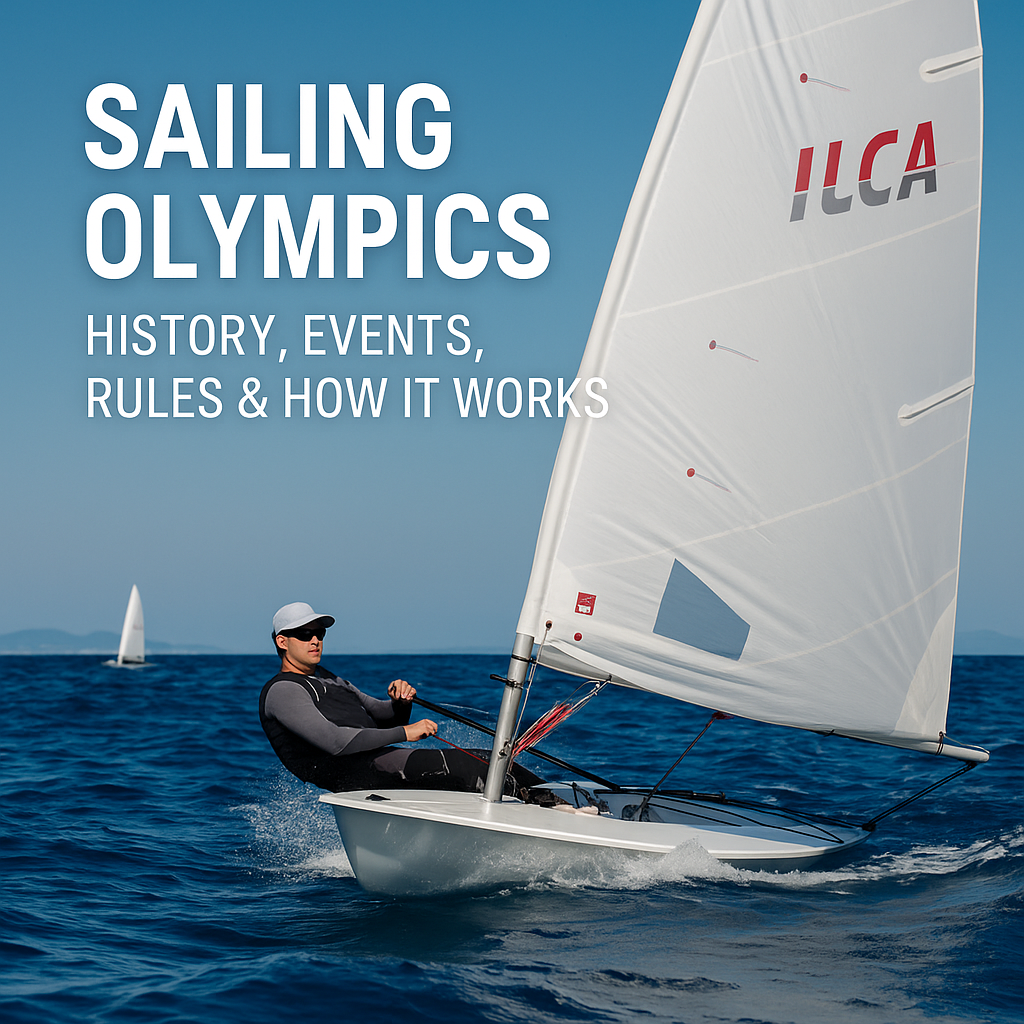Sailing Olympics: History, Events, Rules & How It Works

The Sailing Olympics is one of the most thrilling and strategic water sports in the world. From wind-powered speed to smart navigation, it brings out the boldest and most brilliant sailors. This article guides you through the magic of Olympic sailing — built with trust, verified facts, and written by experts in the sport.
What is Olympic Sailing?
Olympic Sailing, also called sailboat racing, is a sport where athletes race boats using only wind power. It combines strength, balance, and brainpower. Every four years, sailors from around the world compete in high-speed, high-skill races that test teamwork and timing.
History of Sailing in the Olympics
Sailing first became an Olympic sport in 1900 in Paris. Though early races were weather-dependent, sailing evolved with strict rules and global participation. By 1908, it was a regular Olympic event. Today, sailing stands strong as a test of nature, knowledge, and endurance.
Types of Sailing Classes in the Olympics
Olympic sailing includes different boat classes, each designed for speed, skill, and challenge:
- ILCA (Laser): Single-person, fast, and responsive
- 470: Two-person dinghy, tactical and tight
- 49er / 49erFX: Fast skiffs, very dynamic
- Nacra 17: Mixed-gender catamaran, high-tech and fast
- iQFOiL: Windsurfing on a foil board
- Kiteboarding: Introduced for Paris 2024
Each class showcases unique sailing talents.
Sailing Events and Gender Categories
The Olympics ensure gender equality with men’s, women’s, and mixed-gender events. Mixed races like the Nacra 17 add exciting dynamics and promote inclusiveness. This balance makes Olympic sailing one of the most forward-thinking water sports.
Countries That Dominate Olympic Sailing
Some countries are true sailing powerhouses:
- Great Britain leads with the most Olympic sailing medals
- Australia and New Zealand shine with strong windsurfing and skiff performance
- USA has a deep history in yachting
These nations invest in youth training and high-tech boats.
Rules and Scoring in Olympic Sailing
Sailors earn points based on finishing position in each race. Lower points are better. After a series of races, the sailor or team with the fewest points wins. A final “Medal Race” is worth double points and decides the winners. Rules are strict, fair, and globally accepted.
Looking for a sharp, sporty hairstyle to match your sailing vibe? Check out the Low Taper Fade for a clean, aerodynamic look.
Venues and Conditions for Sailing in the Olympics
Olympic sailing needs open water, strong but safe wind, and international-grade facilities. Past venues include:
- Enoshima, Japan (Tokyo 2020)
- Weymouth, UK (London 2012)
- Rio de Janeiro, Brazil (2016)
Conditions like wind speed and wave height play a big role.
Schedule and Format of Olympic Sailing Competitions
Events last over 10 days. Sailors compete in multiple races. Only the best results count, and the final race can change everything. The format pushes consistency, strategy, and nerves of steel.
Famous Olympic Sailors and Records
- Ben Ainslie (UK): Most decorated Olympic sailor
- Robert Scheidt (Brazil): Laser and Star class legend
- Marit Bouwmeester (Netherlands): Leading female ILCA sailor
These athletes became icons through hard work and heart.
How to Get Into Olympic Sailing
Start early with local sailing clubs. Learn boat handling, safety, and strategy. Compete in youth regattas. Work up to national teams. The Olympic dream starts with one brave sail and a clear goal.
Want to enhance your style both on and off the water? Discover subtle hair color trends with our guide to the Strands Hint technique.
Future of Sailing in the Olympics
Sailing is going green with eco-friendly boats and digital race tracking. New formats like kiteboarding keep the sport fresh. More countries are investing in sailors, making the Olympics more exciting and diverse than ever before.
FAQs About Olympic Sailing
What boats are used in Olympic sailing?
Sailing classes include ILCA (Laser), 470, 49er, Nacra 17, iQFOiL, and kiteboards.
How is sailing scored in the Olympics?
Points are awarded based on finishing position. Lowest score wins. Final race counts double.
When did sailing become an Olympic sport?
Sailing debuted at the 1900 Paris Olympics and became a regular event in 1908.
Which country has won the most Olympic sailing medals?
Great Britain leads the medal count in Olympic sailing.
How can I qualify for Olympic sailing?
Join a sailing club, race at national and international levels, and meet your country’s qualification standards.